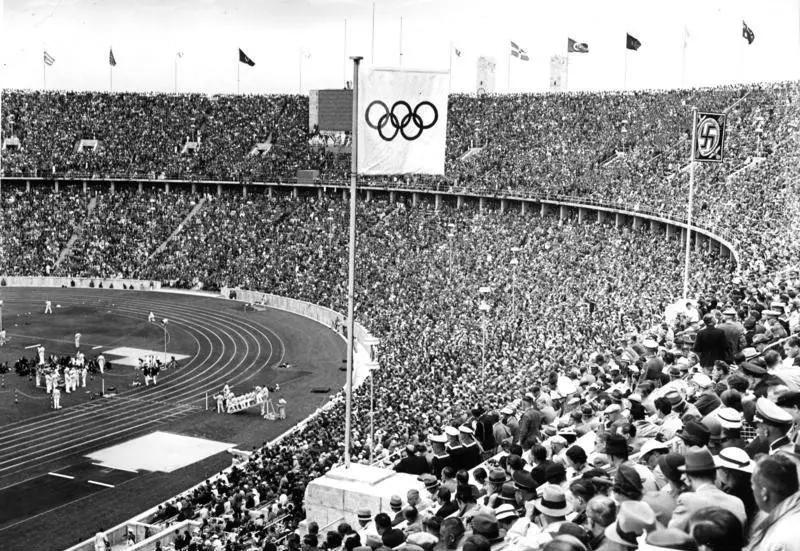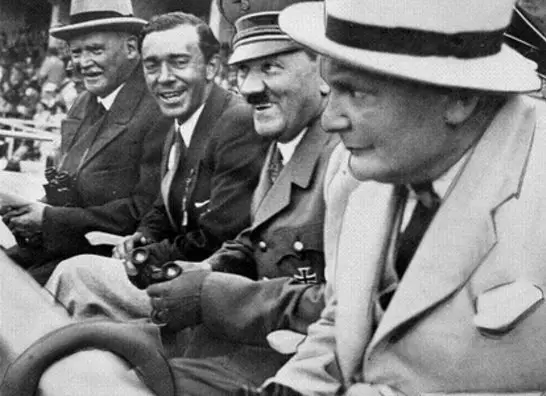The Olympics of 1936, officially called the Games of XI Olympiad took place in Berlin, Germany after winning the bid to host the games in 1931.
At this time, the Nazi party had gained political domination in Germany, two years after the appointment of Adolf Hitler as chancellor in 1933. In just a short time, Hitler had transformed the Weimar Republic into the Third Reich, a single-party dictatorship based on the totalitarian and autocratic ideology of Nazism.
Hitler had seen the games as a means to put Nazi Germany on the world map, with the aim to impress visiting nations and restore German pride after the defeat and signing of the Versailles Treaty back in 1918. In preparation for the event, Germany built a new 100,000-seat track and field stadium, six gymnasiums, swimming pools and many other smaller arenas.

Leading up to the games, the Nazi control of all aspects of German life had extended into sport. All imagery of 1930’s sports promote the “Aryan” racial superiority and physical prowess. Such imagery also reflected the importance the Nazi regime placed on physical fitness, a prerequisite for military service.
In April 1933, an “Aryans only” policy was instituted in all German athletic organizations. “Non-Aryans”—Jewish or part-Jewish and Romani (Gypsy) athletes—were systematically excluded from German sports facilities and associations.
As part of this exclusion policy, the German Boxing Association expelled amateur champion Erich Seelig in April 1933 because he was Jewish. Daniel Prenn—Germany’s top-ranked tennis player—was removed from Germany’s Davis Cup Team. Gretel Bergmann, a world-class high jumper, was expelled from her German club in 1933 and from the German Olympic team in 1936.
The Völkischer Beobachter, the official Nazi party paper at the time was broadcasting that Jews and Black people should be banned from participating in the games. This exclusion policy led to a threatened boycott by movements in the United Kingdom, France, Sweden, Czechoslovakia and the Netherlands. There was a debate in America as to whether the nation should boycott, but Avery Brundage, then of the United States Olympic Committee, opposed the idea, stating that Jewish athletes were being treated fairly and that the Games should continue. Brundage asserted that:
“politics played no role in sports.”
Hitler relented on the proposed ban, even adding one token participant to the German team—a German woman, Helene Mayer, who had a Jewish father. However, The German Olympic committee, in accordance with Nazi directives, still virtually barred Germans who were Jewish or Roma or had such an ancestry from participating in the Games.
In the Olympic Charter of 1933, the IOC states:
“Gatherings of young men were one of the best ways to make the different classes in a country as well as the units of different civilizations well acquainted with each other and to promote better understanding. Those who followed did their utmost to improve that wonderful manifestation, which is the sporting criterion of the races of the world, and contributed worthily to bring together those who have taken part in the Games.
The National Olympic Committees, to fulfil their duty, must avoid any political or other influence and when called upon to take a decision be actuated only by general interest without taking into consideration local questions or the desire to favour national competitors. – IOC Charter 1933″

As athletes begun to arrive for the games, Berlin went through a sudden transformation in order to camouflage the racist and violent policies. Anti-Jewish signs such as “Jews not wanted” were removed from walls and shop fronts, newspapers were ordered to tone the rhetoric and hotels in the area were ordered to be as hospitable as possible to visitors. Officials also ordered that foreign visitors to the Olympics wouldn’t suffer prosecution by the German anti-homosexuality laws at the time.
Behind the scenes, The German Ministry of the Interior authorised the arrest of 800 Romani (Gypsies) around Berlin in a campaign to improve the “New-Germany” image and place them in the Berlin-Marzahn concentration camp. Eventually, the men from Marzahn would be sent to Sachsenhausen concentration camp (in 1938), and women and children sent to Auschwitz (in 1943).
During the games, Hauptmann Woflgan Fürstner, the commandant assigned to the Olympic Village was replaced abruptly by Werner von Gilsa who was the commander of the Berlin Guard Regiment. Although the official stance given was failure in not acting “with the necessary energy,” the reasoning was just a pretext over Fürstner’s half Jewish lineage. Shortly after the games concluded, Fürstner committed suicide after learning that the Nuremberg Laws would classify him as a Jew.
The Games
A total of 49 nations attended the Berlin Olympics, up from 37 in 1932. Five nations made their first official Olympic appearance at these Games: Afghanistan, Bermuda, Bolivia, Costa Rica and Liechtenstein. Germany fielded the largest team with 348 athletes. The US team was the second largest, with 312 members, including 18 African Americans.
Germany emerged victorious with German athletes winning 89 medals.
| Rank | Nation | Gold | Silver | Bronze | Total |
| 1 | Germany (host nation) | 33 | 26 | 30 | 89 |
| 2 | United States | 24 | 20 | 12 | 56 |
| 3 | Hungary | 10 | 1 | 5 | 16 |
| 4 | Italy | 8 | 9 | 5 | 22 |
| 5 | Finland | 7 | 6 | 6 | 19 |
| 6 | France | 7 | 6 | 6 | 19 |
| 7 | Sweden | 6 | 5 | 9 | 20 |
| 8 | Japan | 6 | 4 | 8 | 18 |
| 9 | Netherlands | 6 | 4 | 7 | 17 |
| 10 | Great Britain | 4 | 7 | 3 | 14 |
Hitlers plan for the games was certainly a success in placing Germany on the world playing field. The New York Times reported that the Games put Germans “back in the fold of nations,” and even made them “more human again.”
“The sportive, knightly battle awakens the best human characteristics. It doesn’t separate, but unites the combatants in understanding and respect. It also helps to connect the countries in the spirit of peace. That’s why the Olympic Flame should never die.”— Adolf Hitler
The world was given the false impression that the interlude of peace would endure, but behind the deception, Hitler pressed on with grandiose plans for German expansion, ethnic cleansing and mass murder on a scale that to this day, leaves a stain on the Olympics and the International Olympic Committee for their choice in choosing Hitlers Nazi Germany as the host nation.
Header Image Credit : Ben Sutherland




